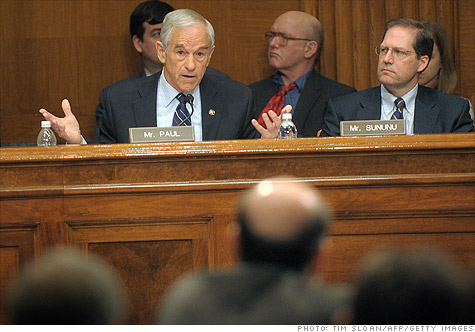-----------------------------------------------
When the Federal Reserves (Fed) of the United States was created in 1913, it was structured so that it could maintain independence from the Government and Congress; the idea was that, in the Fed's own terms, "the people who control the country's money supply should be independent of the people who frame the government's spending decisions" (i.e. Congress). Now the situation is rather bizarre: the Republicans in the Congress try their best to make sure Ben Bernanke stop injecting money into the economy - or to be very honest, they actually would want Ben Bernanke to be gone.
The Republicans are concerned by the very basis knowledge that any first-time learner in Introduction to Macroeconomics must know: when you implement expansionary monetary policy, inflationary expectation and, hence, actual inflation tend to move up together. However, I would argue that they had ignored two things:
 |
| Ron Paul debating with Ben Bernanke during a Congress meeting Photo: CNN |
1) When consumer confidence is low and aggregate demand is weak, inflation can't pick up that fast, which still leaves the government capacity to stimulate the weak economy further more. In fact, inflation rate in 2011 was well-below 4%. People look at inflation as the first derivative of price (how fast price changes), I would like to look at the second derivative (how the rate of inflation changes). In fact, after inflation picked up at the beginning of 2011, the rate of increase of inflation has started to slowed down. By January 2012, inflation has dropped. That doesn't look to me like a booming economy at all - rather a weak economy fluctuating up and down. Hence, now is not the time to worry about inflation.
2) The increase of inflation isn't necessarily bad, especially when the economy is not at full employment. Normal Keynesian stabilization policies require that we must endure a bit of inflation during expansionary time. Yet, Republicans - as mostly the haters of Keynesian economics - tend to favor the self-correcting mechanism. That is, they would rather wait for unemployed people to beg for lower wages, which would in turn increase aggregate supply, fixing the economy without the cost of inflation. Let me tell you how this won't work (and I'm not reusing the Keynesian usual reason "stickiness of wages"): The minimum wage is already too low. Even though the nominal wage seems to have continuously increased, the real wage actually has mostly decreased since 1970. Any attempt to lower people's real wage further is simply inhumane. In the end, the price won't rise as much, yet that doesn't even matter because people don't have money to buy the goods anyways.
 |
| US Consumer Price Index from 2009-2011 Photo: Tradingeconomics.com |
 |
| The movement of federal minimum wage (Pink line indicates real wage) |
This post is another reason why one should really think twice when voting for a Republican - be it Mitt Romney, Newt Gingrich or Ron Paul or whoever else - to be President. Any of them is so ready to get rid of Ben Bernanke, and trust me, it's hard to find another intellectual and creative Fed Chairman like him.
------------------------------
Vu T. Chau
Princeton, Feb 7th, 2012
--I don't own or make any photos in this blog post.--


chị thích bài viết này của em lắm V ơi.
Trả lờiXóachị Dzung (VYF2009)
Cảm ơn chị đã dành thời gian đọc :) Chị có đang học kinh tế không ạ?
Trả lờiXóa